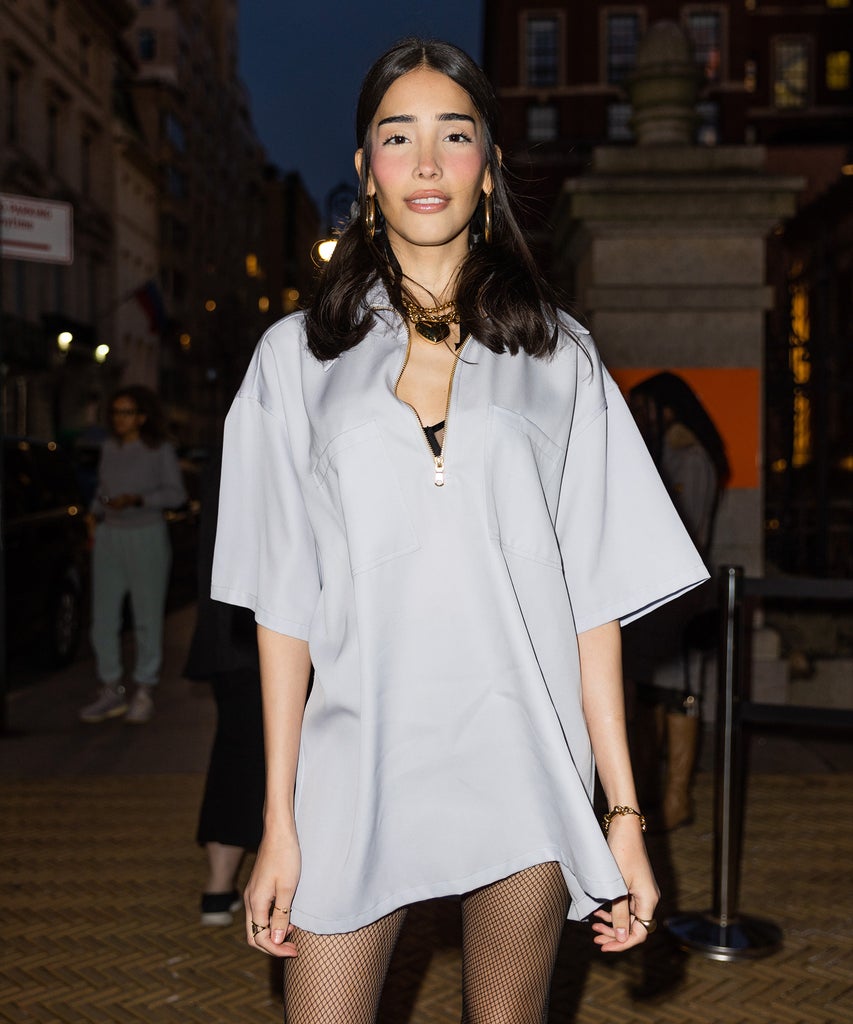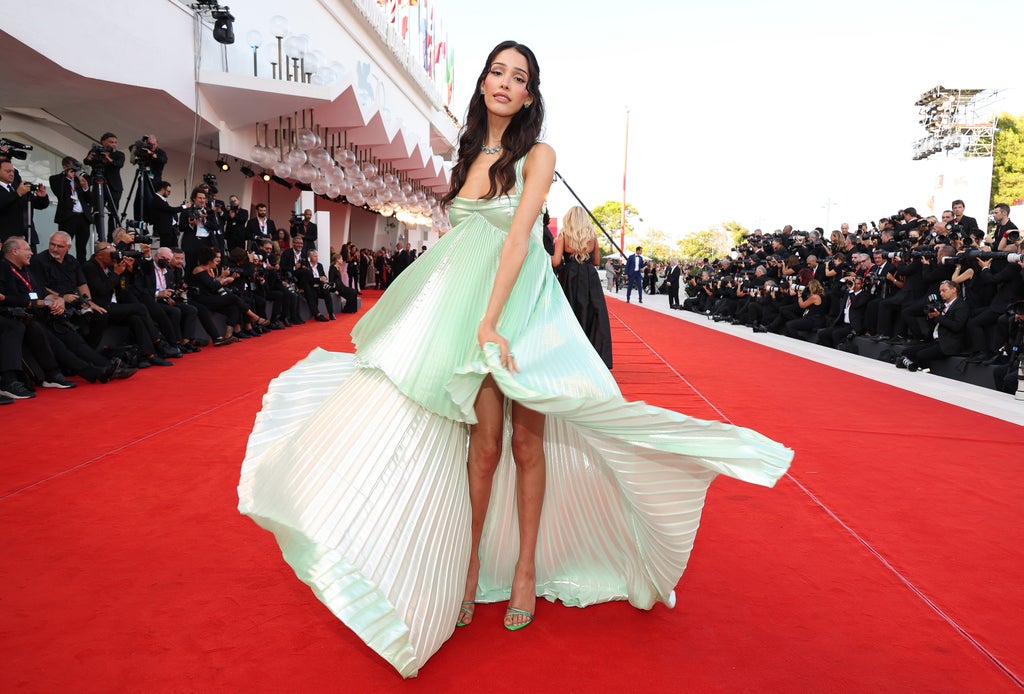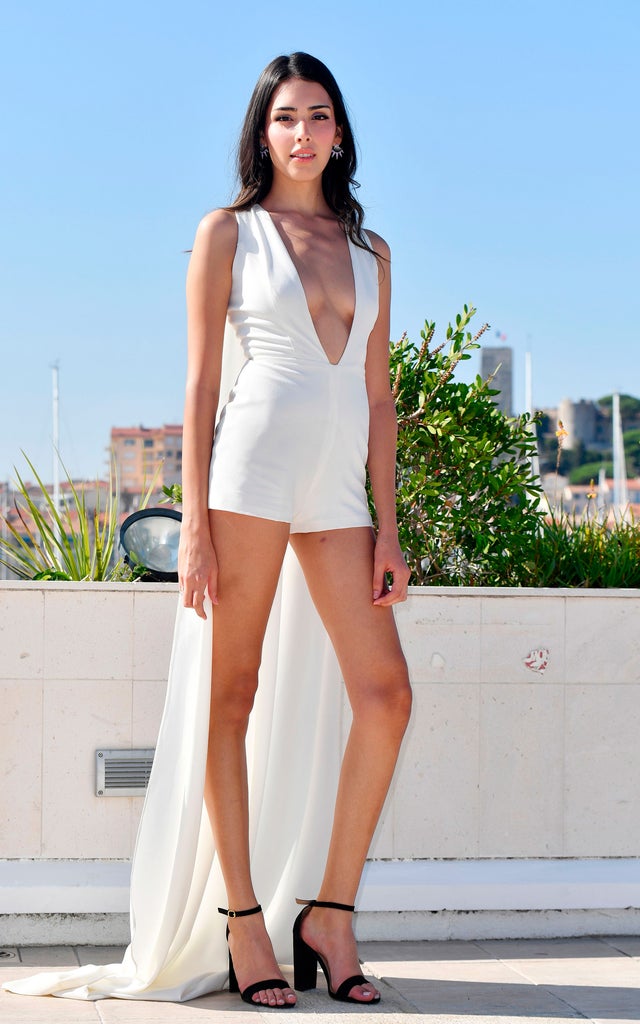
“OK, so full transparency here: I haven’t really spoken about this,” says Zión Moreno. “I feel like all the other cast members have said something. But I haven’t really said anything.”
It’s mid-February, less than a month after HBO Max suddenly announced it was canceling the buzzy, oft-discussed Gossip Girl reboot after two seasons. In the show, Moreno plays Luna La, a wealthy Mexican-American teen who’s part of the elite student class at the fictional Constance Billard St. Jude’s School.
For most of the two-season run, Luna fills several roles within her friend group, from de facto stylist for the Instagram-famous Julien Calloway (Jordan Alexander) to confidante and pseudo therapist to Max Wolfe (Thomas Doherty). It isn’t until the eighth episode of season two, aptly titled “Y Lu’s Mamá También,” that more of Luna’s backstory is revealed — namely, the fraught relationship she has with her distant, narcissistic mother.
“It was tough for me because I have an incredibly amazing relationship with my mom,” Moreno tells Refinery29 Somos. “She’s actually the complete opposite of Dolores (Fernanda Loreto Urrejola Arroyo). She champions me in every way. I had to work a little bit harder in finding what that would be like if your mother was jealous of you, does not want you to succeed, and does not want you to be her daughter — like how awful that would feel.”
In that same episode, Luna speaks with her abuela in the back of a car, ultimately confronting her when it becomes clear that she’s keeping secrets about Dolores. Moreno filmed the entire scene in Spanish, an opportunity that was significant for the Mexican-American actor.
“I was excited to sink my teeth into something concrete and a little bit more complicated and complex, aside from just being Julien’s right-hand woman,” Moreno says.
In the season two finale, Luna seems on the cusp of stepping outside the shadow of her friends: She’s scouted for a modeling gig at the Met Gala and by the end of the episode, as some of the core group is on summer vacation in Rome, her image is plastered on billboards for a big fashion campaign. As viewers, we’re left to assume Luna grew tired of being a background player and was, at last, stepping into her main character era.
“I knew season three was going to be Luna’s rise to fame and adding layers to her character. So throughout the entire process of filming season two, I was anticipating season three. And then it happened.”
Zión Moreno
“It was going to be Luna’s season finally and that’s something I knew from the very beginning of season two,” Moreno says. “I knew season three was going to be Luna’s rise to fame and adding layers to her character. So throughout the entire process of filming season two, I was anticipating season three. And then it happened.”
By “it,” Moreno is of course referring to the show’s cancellation, but as she processes the experience, she likens “it” to something else.
“It sounds as if I went through a death,” she says. “Well, I guess I did go through a death. I think I’ve gone through all the five stages of grief, honestly.”
Though she shares that she’s reached the acceptance stage, it still hurts to consider what might have been for Luna, arguably an under-utilized character on the reboot who, quite frankly, deserved more screen time and robust storytelling.
“I was really gutted,” she says. “I think he [executive producer and showrunner Joshua Safran] felt particularly bad for me because he knew it was going to be such an amazing season for Luna. And I know so many fans wanted to see that.”

Moreno characterizes Luna’s evolution on the show as a journey of invisible insecurity turned into out-and-proud strength. “She finally stood in her power and realized she was much more than she gave herself credit for,” she says. “I can relate to that and I think a lot of us can relate to that.”
What’s more, Luna’s story never centered on her identity as a trans woman. For Moreno, who recently turned 28 and transitioned when she was 13, it was refreshing, in a way, to step into the role of a trans character who wasn’t explicitly — or solely — defined by gender identity.
“I have to give a lot of credit to the writers for really not making her story about her being trans at all,” she says. “Of course, I think about it a lot because it’s who I am. But it does not dictate my life and we need more characters that are trans that have stories outside of that, you know? We’re multi-dimensional people.”
Born in El Paso, Texas to Mexican immigrants, Moreno’s family relocated when she was about eight or nine, settling in Albuquerque, New Mexico.
“I like to say that I became myself in Albuquerque,” she says. “My sister was always extremely extroverted and my brother was just like the golden boy. And then there was me, the one they really didn’t know what to do with — so I think that really just kind of lit a fire in my heart to leave and to recreate myself.”
“We need more characters that are trans that have stories outside of that, you know? We’re multi-dimensional people.”
ZIÓN MORENO
Even so, she never wanted to be a performer. Not once did she consider an acting career. In fact, she had her sights set on becoming a writer, even briefly attending the University of New Mexico on a full-ride scholarship. She studied journalism, hoping to travel the world and do investigative reporting.
“I was actually a pretty good student, but then I started dating this guy and he was kind of a bad boy,” she recalls. “It was my first experience with a bad boy because I was always a goody two-shoes and I just fell into his world.”
She started skipping class, receiving failing grades. Before long, she had lost her scholarship. Ultimately, she dropped out and moved to New York City on a whim, encouraged by friends and acquaintances who said she should take up modeling. At first, she lied to her mom and said that she had a place to stay in New York, when in reality she was couch surfing.
“She wanted me to come back immediately and was sobbing her eyes out,” Moreno says. “And I’m like, ‘Just believe in me please,’ and my mom called me every moment of every day to see if I was OK, but she believed in me. I’m also her baby ,so I think it was extra difficult for her. I’m sorry for putting her through that, but I know she’s really proud of me now.”

Indeed, Moreno’s leap of faith paid off. She was soon scouted on the street — “which I know is crazy,” she says — and her modeling career began. Then, two years into life as a working model, she moved to Los Angeles and fell for an aspiring musician. They were married soon after.
“That was a whole love story for me and it was really beautiful,” she says. “But I was way too young and we ended on good terms. But I am a divorcée now.”
After her divorce, since she’d already been living in LA for so long, she met a lot of people in the entertainment industry who thought she should give acting a shot. She booked the first audition she went to.
“Ever since, I’ve realized it was my passion and I haven’t stopped since,” she says. “It all just happened randomly, but in a very faithful kind of way.”
“I’m trying to keep the ball rolling on the creative side of things, but I would just love to continue to do art that speaks to people, that is raw and gritty and real.”
ZIÓN MORENO
Moreno’s innate ability to adapt in any situation — no matter how seemingly challenging or precarious — has undoubtedly served her well. With Gossip Girl in the rearview, she’s leaning on her agility to navigate where the path ahead may lead. She hopes to continue to act, especially in indie movies. She’s in the process of writing a poetry book, in addition to her own script for a feature film that she would also love to direct.
“I’m trying to keep the ball rolling on the creative side of things, but I would just love to continue to do art that speaks to people, that is raw and gritty and real,” she says.
Despite the many unknowns Moreno has faced throughout her life, it’s all led to this moment. And, coincidentally enough, when she reflects on where her alter ego wound up in the series finale, her musings could ring true for both Luna’s and Zión’s respective journeys.
“It was tough,” she says. “But I guess she got the happiest ending out of all of them.”
Like what you see? How about some more R29 goodness, right here?

















